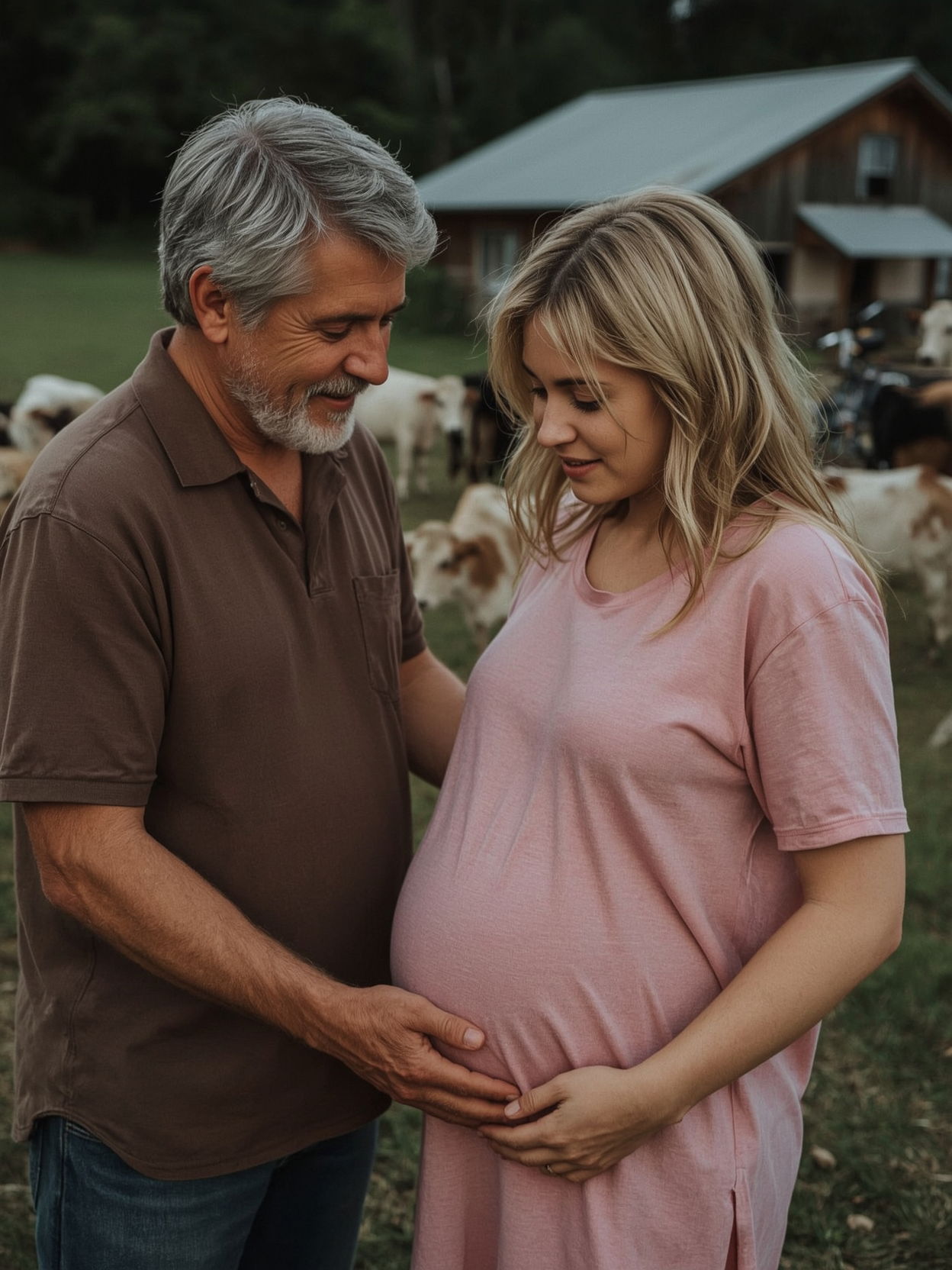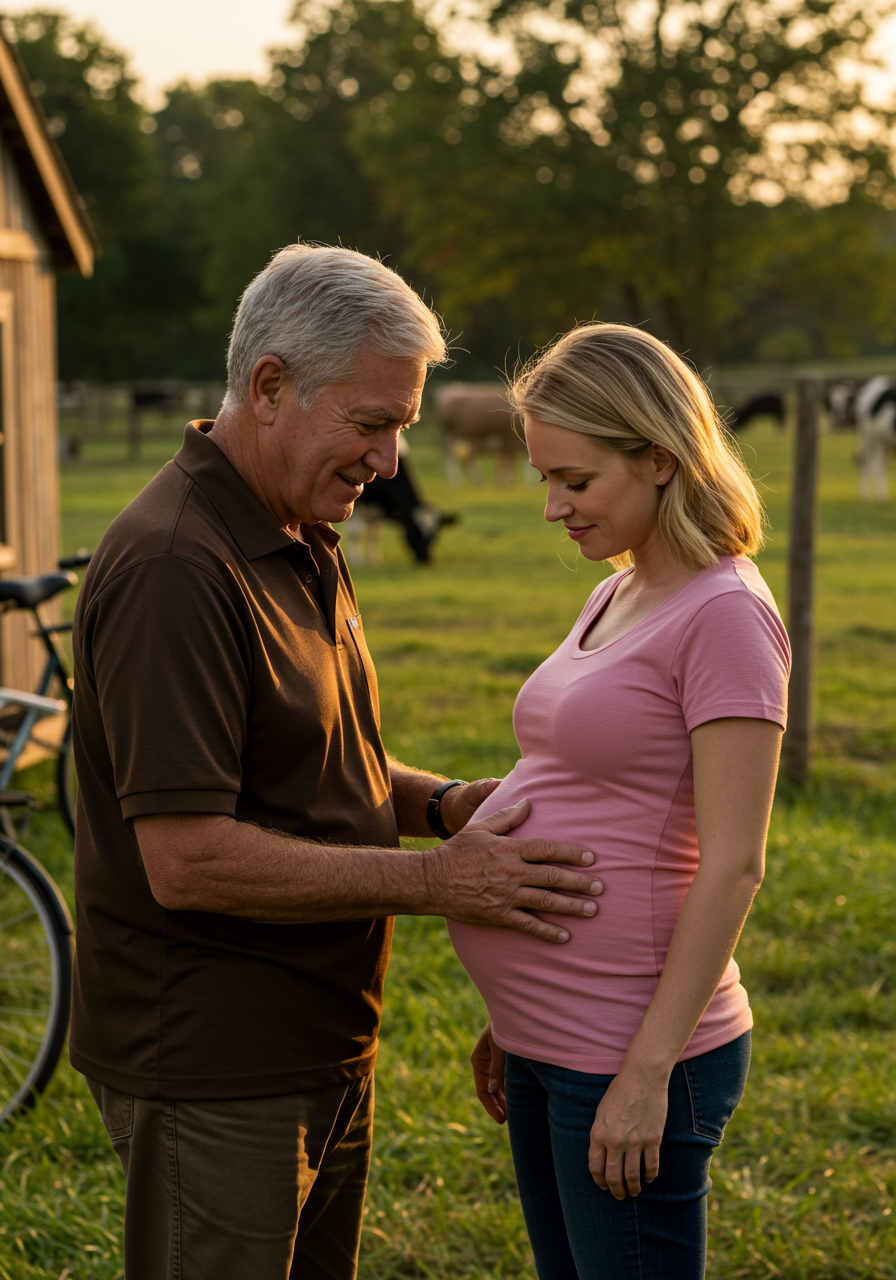A late-season thunderstorm hammered down on the outskirts of Austin, turning the dusty roads of the small town to mud. Under the rusted awning of a closed-down auto shop, a young woman huddled, clutching her pregnant belly, her eyes lost. Her hair was soaked, her thin shirt no match for the sudden chill. Her name was Maya, once a junior at UT, studying to be a teacher. That dream shattered when she fell for a married man. When she got pregnant, he abandoned her. Too ashamed to go home, she’d drifted through cheap motels until today, when she was kicked out for being out of cash. She sat silently in the downpour, waiting for a miracle that felt a million miles away.
An old man on a worn bicycle stopped nearby. Seeing her shiver, he held out a simple sandwich wrapped in wax paper. His voice was gentle. His name was Samuel, a retired veteran who sold scratch-off lottery tickets to pass the time. He lived alone. He offered her his spare room. Maya hesitated, but the kindness in his eyes was so genuine she found herself nodding. His small apartment was simple but warm. For the first time in weeks, she felt safe. He gave her dry clothes, made her soup, and never once asked about her past.
She woke the next morning to a quiet peace. He called her “our guest,” a title she hadn’t heard in ages. Breakfast was just toast and coffee, but it was delicious. She didn’t know where she would go, only saying she was looking for work. He told her he’d lost his own daughter in a car wreck years ago. Seeing Maya, he said, felt like a piece of his daughter had come back. She was moved to tears, unsure how to repay him. “Just be a good person,” he said simply. “That’s all the payment I need.”

Maya stayed, helping around the apartment. Though the neighbors whispered, she ignored them. The only person she trusted was Samuel, who asked for nothing and quietly shared what little he had. One day, she noticed his cough had gotten worse. She took him to a clinic and was devastated to learn he had a severe lung infection. She resolved to care for him. She found odd jobs cleaning, coming home at night to look after him. Though exhausted, the despair in her eyes began to fade. She was learning to live with purpose.
One rainy afternoon, a knock came at the door. It was a lawyer representing the father of her unborn child. He offered her a check—a large one—in exchange for her signing away any future contact. Maya felt the blood drain from her face. She had never told Samuel the painful details of her past.
One morning, a local reporter approached Samuel. He’d heard the story of the old vet and the pregnant girl and wanted to write about it. Samuel hesitated, then nodded. “If it helps her find a better footing, then write it.” A few days later, the article, titled “The Lottery Ticket Vet and the Girl the World Forgot,” went viral. The community was moved. Donations arrived: money, baby clothes, formula. A local charity for single mothers offered Maya a job in their outreach department.
Time passed. One afternoon, she found an old photo in Samuel’s wallet: a younger him with a teenage girl holding a baby. It was his daughter. She had run away at eighteen. He’d searched for her, but eventually lost her trail. Maya placed a hand on his shoulder in silent understanding. Perhaps it was because he had lost his own daughter that he cared for her so deeply.
As her due date neared, a gruff neighbor, Brenda, started stopping by more often, bringing soup and fruit. One cold night, Maya went into labor, calling out for Samuel before passing out. She woke up in the hospital, Brenda at her side. Her son was a healthy seven pounds, Brenda told her, but she had almost died.
Her son was named Luke, meaning “light-giver.” Samuel built a cradle from scrap wood. With Luke, Maya’s life transformed. When the charity asked to film her story, she was terrified. But the director told her, “You don’t have to tell everything. Just be real.” The video spread like wildfire. Her story of resilience gave other women courage.
One morning, she received an anonymous letter. Inside was a high school photo of her and a single line: “I’ve been watching from afar. I was wrong. Forgive me, if you can.” It was from her mother. Maya clutched Luke tightly, realizing she hadn’t been completely alone after all.

The next day, Maya called the number on the lawyer’s old card and met with Mr. Davies, the father of Ethan, her ex-boyfriend. He admitted his son’s irresponsibility was his fault. He wanted to make amends—not with money, but by being a grandfather, if she would allow it. Though wary, Maya sensed his sincerity. She refused any financial help, saying her son only needed genuine love.
Life moved on. Maya thrived at her job, but then received a surprise offer to manage a large, popular diner. A customer had been impressed by her work ethic. She took the leap. Two months later, sales were soaring, and the owner made her a partner.
One day, Mr. Davies returned with his wife—Luke’s grandmother. They brought a letter, not demanding, but humbly asking for permission to love the child. Maya’s tears were of relief. She realized forgiveness was a gift she was giving to herself.
Just when life seemed settled, Ethan called. He wanted to meet. He showed her the test results: stage-two kidney failure. He wasn’t asking for help, just for a final meeting. Maya looked at the man she once loved. She told him she had healed on her own and hoped he could learn to love himself. That night, she told Luke a story about a pearl that turns pain into light. “Do you have a pearl like that, Mommy?” he asked. Maya smiled, placing her hand on his chest. “I think I found it, sweetheart. It’s you.”
